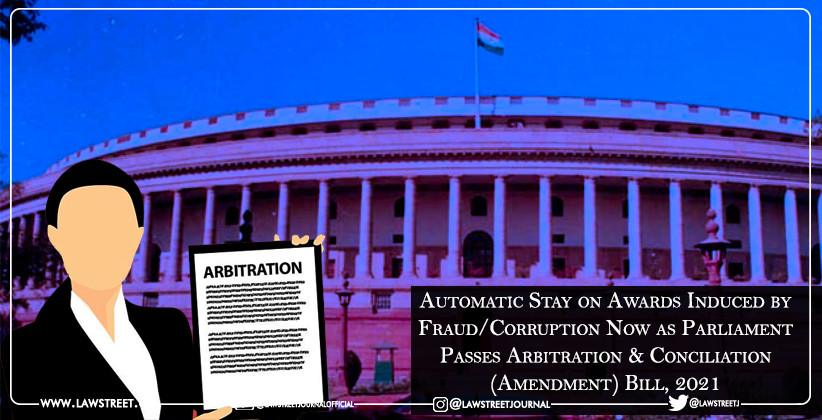The Arbitration & Conciliation (Amendment) Bill, 2021 was passed by the Rajya Sabha on Wednesday (March 10, 2021) by voice vote.
Lok Sabha had passed the said Bill on February 12, 2021. It is supposed to replace an ordinance which was promulgated on November 4, 2020.
It will amend the Arbitration & Conciliation Act, 1996 in order to (i) entitle automatic stay on awards in certain cases (ii) specify the norms, qualifications and experience for accreditation of Arbitrators.
The Statement of Object annexed to the bill said:
"In order to address the issue of corrupt practices in securing contracts or arbitral awards, a need was felt to ensure that all the stakeholder parti es get an opportunity to seek unconditional stay of enforcement of arbitral awards, where the underlying arbitration agreement or contract or making of the arbitral award is induced by fraud or corruption.
Also to promote India as a hub of international commercial arbitration by attracting eminent arbitrators to the country, it was also felt necessary to omit the Eighth Schedule of the Act. In the light of above circumstances, it has become necessary to further amend Arbitration & Conciliation Act, 1996.
Prominent Features
- Automatic Stay on Awards
Previously, a party could file an application under Section 34 of the said act for setting aside an arbitral award. However, there was a change after the 2015 amendment to Section 36 of the act. This amendment facilitated that an automatic stay wouldnt be granted by merely filing an application for setting it aside on operation of the award.
It has been clarified by the Bill that a stay on the arbitral award may be granted by the Court even while the pendency of the setting aside application, in case if it is prima facie satisfied that the arbitration agreement or contract/ making of the award in question was induced by fraud or corruption. This shall be deemed effective from October 23, 2015.
- Qualifications of the Arbitrators
The Schedule VIII of the Principal Act contains various parameters for qualifying as an Arbitrator, such as experience, qualifications along with accreditation norms for arbitrators. These included that n arbitrator must be: (i) an advocate under the Advocates Act, 1961 with 10 years of experience, or (ii) an officer of the Indian Legal Service, among others.
This bill strives to omit Schedule VIII along with stating that these qualifications, experience and norms shall be notified by regulations.
- Parliamentary Debate
While the bill was being discussed, the Opposition interrupted it by asking for immediate discussion on Farm Laws along with rising fuel prices.
The bill was supported by BJP MP, Amar Patnaik. He also went on to raise a technical query regarding the amendment. He pointed out that while the proviso to Section 24(2A) provides not setting aside of a reward on the ground of erroneous application of law or by reappreciation of evidence; how is it possible to establish a prima facie case stating that the award was induced by fraud/corruption without reappreciation of evidence, when given that fraud is a mix of law as well as facts. Henceforth, it cannot be decided merely on the basis of the evidence recorded in the initial arbitral award.
The bill was also supported by Ayodhya Ram Reddy, YSRCP MP. He said that it will be interesting to note how the courts will be interpreting the burden to prove a prima facie case of corruption or fraud. He also went on to say that the provisions will also be demonstrated in the case where the parties may use it to stall the operation of the award by filing an application under Section 36, aiming to waste the precious time of the court. He also made the suggestion to the court to stay cautious while formulating a test to grant an unconditional stay on the award.
Kanakamedala Ravindra Kumar, TDP MP also supported the bill even though he went on to express his apprehensions speedy disposable may be defeated by the provision of an unconditional stay. He said that there is no need to further make any provisions when Section 36(3) of the Principal Act is enough to grant a stay on the operation of award. Along with this, he also added that the retrospective application of the Amendment Act (from 2015) with regard to automatic stay may open floodgates of litigation along with affecting the ease to do business.
As in the ongoing debate, Ravi Shankar Prasad, the Law Minister went on to inform the house that despite the use of the words fraud/corruption in Sec 34, the proposed amendment to Section 36 was imperative as the former does not provide for an automatic stay of the award. He said that this will be in furtherance of Section 34 which states that an award which is in conflict with public policy may be set aside.
Regarding the omission of Schedule VIII of the Act, he said that this will lead to greater flexibility in the Arbitration Council of India along with promoting institutional arbitration by inviting arbitrators from abroad, which will thus make India a hub of International commercial arbitration. This proposed omission was appreciated by various members of Lok Sabha as well when the bill was being discussed there.
Lastly, as much as there is support for this amendment, there is equal opposition as well on the following terms:
- The Amendment might be drawing parties to the court and litigation, thereby defeating the whole purpose of Alternative Dispute Resolution Mechanisms.
- The bill does no define corruption/fraud.
The amendment is going to affect the ease of doing business along with enforcement of contracts.








